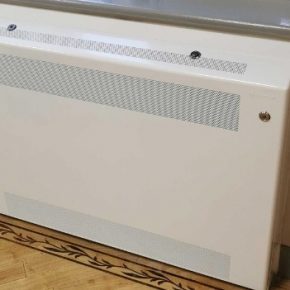
Contour: Selecting Radiators For High Secure Mental Health Units
Psychiatric intensive care units (PICUs) look after patients who cannot be managed on open psychiatric wards due to the level of risk the patient poses to themselves or others. With this in mind, architects and specifiers must ensure a PICU is as secure and comfortable as possible. Contour explain more about selecting radiators in PICUs…
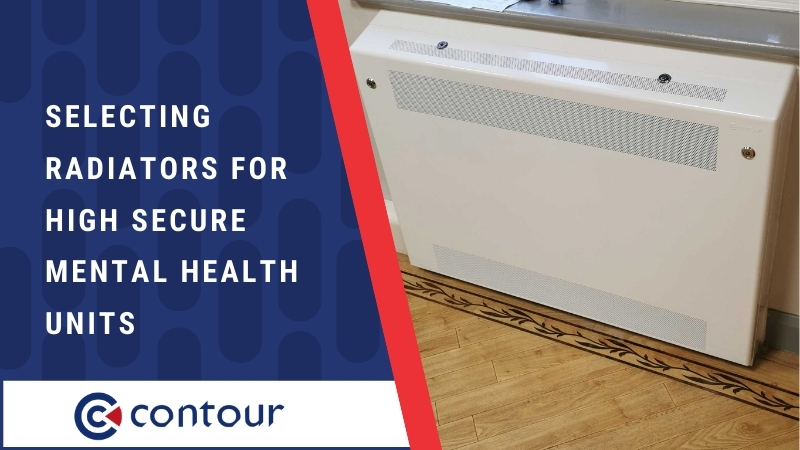
Anti-Ligature Radiators That Offer Durability For High-Secure Mental Health Hospitals
There is a high risk of vandalism, self-harm, and inflicted injuries to others. Therefore, specifiers should consider a radiator that offers the durability and ligature mitigation to withstand the demands of these environments.
When vandalism occurs, users can destruct a heating solution – or any fixture – until there are sharp objects or exposed ligatures. This causes a significant risk to staff and Service Users alike.
It’s important to understand the changes to high-secure mental health facilities over the past few years, with many now offering more freedom to Service Users.
Users have more access to personal belongings and more control over their comfort.
Whilst this extra independence may improve morale in such a facility, it does create more opportunities for Users to carry out acts of vandalism and self-harm.
Bottom line: what was once an appropriately robust radiator or guard may need evaluating to ensure it meets the challenges that modern-day PICUs face.
As service users are bringing more belongings into high-secure mental health units, they are finding more ways to vandalise furniture to inflict self-harm or injury to others.
Behaviour in a PICU can be unpredictable and, therefore, can lead to potentially unsafe situations. To protect all service users, search for an anti-ligature radiator made from 1.5-2mm Zintec steel. For maximum defence, search for a 3mm Zintec steel solution.
The addition of strengthening struts can increase durability too.
Anti-Ligature Radiators In PICU’s
Architects and specifiers are constantly searching for ways to reduce the risk of self-harm and suicide in custodial settings, and it’s especially important for PICUs.
The unpredictable nature of the individuals in PICUs means it’s key that furniture, fixtures, fittings and appliances maintain safety standards, providing a comfortable, secure, and safe environment.
It’s often the belief that suicide risk comes from ligature points that are above head-height. However, studies show suicides can, unfortunately, occur where ligature points have been below the head or even at waist height.
For this reason, it’s necessary to select a radiator that is anti-ligature to keep all individuals safe and secure.
To guarantee the minimisation of all ligature risks, search for an anti-ligature radiator that follows these certain characteristics:
– Small grilles, (IP3X rated grilles is the recommendation)
– (If wall secured) No large gaps between product and wall
– Minimal gaps or joints
– No sharp edges
– Bullnose, rounded corners
– Security locks and fixings
As service users gather their belongings, risks increase in storing contraband in stash points. With anti-ligature radiators, the risk of stash points will be significantly lower, to further protect all users.
Contour Conclusion
To ensure security in PICUs as a specifier or an architect, search for an anti-ligature radiator that is built to withstand vandalism and is safer in terms of anti-ligature risks.
Contour anti-ligature radiators are made in Zintec protected steel in various gauges from 1.5mm-3mm to offer a strong, durable heating solution.
If your PICU needs extra strength, Contour can provide a strengthening strut to provide additional depth and protection.
For anti-ligature features, Contour’s radiators can be anti-ligature with safe edges and IP3x grilles to reduce injuries.
All radiators come with a five year warranty against defects in workmanship and materials for five years from purchase date.
Contour can be contacted at;
The Mansions
43 Broadway
Shifnal
TF11 8BB
Tel: 01952 290 498
Email: [email protected]
Visit Supplier's page
Latest news
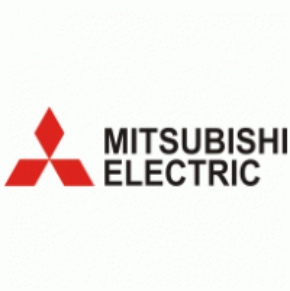
16th April 2024
Mitsubishi Electric set to host CIBSE Journal webinar
Mitsubishi Electric will host a CIBSE Journal webinar on Wednesday 24th April 2024 at 1pm to discuss the legislation and initiatives driving changes in the way we will need to heat, cool and ventilate large commercial buildings to reach net zero emissions in the UK.
Posted in Air Conditioning, Articles, Building Industry Events, Building Industry News, Building Products & Structures, Building Regulations & Accreditations, Building Services, Facility Management & Building Services, Heating Systems, Controls and Management, Heating, Ventilation and Air Conditioning - HVAC, Information Technology, Pipes & Fittings, Plumbing, Seminars, Sustainability & Energy Efficiency, Training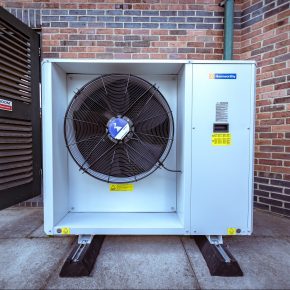
16th April 2024
Hamworthy: What to consider when choosing a heat pump?
At the heart of an efficient heat pump system lies an important element: the refrigerant – Jason Allen, Commercial Product Manager, Groupe Atlantic UK, ROI & NA. Hamworthy Heating is a Groupe Atlantic brand.
Posted in Articles, Building Industry News, Building Products & Structures, Building Services, Facility Management & Building Services, Heating Systems, Controls and Management, Heating, Ventilation and Air Conditioning - HVAC, Pipes & Fittings, Plumbing, Retrofit & Renovation, Sustainability & Energy Efficiency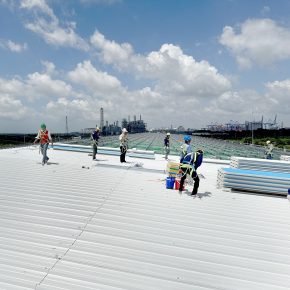
15th April 2024
EJOT Colorfast chosen for Kingspan’s highly sustainable new Asian factory
More than 120,000 EJOT Colorfast self-drilling fasteners have helped Kingspan to create a thermally superior, visually-appealing building envelope for its first purpose-built manufacturing plant in South East Asia.
Posted in Articles, Building Industry News, Building Products & Structures, Building Systems, Case Studies, Posts, Restoration & Refurbishment, Retrofit & Renovation, Roofs, Sustainability & Energy Efficiency
15th April 2024
ASSA ABLOY helps new manufacturing plant achieve LEED Gold certification
Improving sustainability performance is becoming a higher priority for building developers, owners and users. One consequence is fast-growing demand for green building certifications — and therefore specification. Specialist input can make the difference between hitting and missing a project target, as ASSA ABLOY explains here…
Posted in Access Control & Door Entry Systems, Architectural Ironmongery, Articles, BIM, Infrastructure & CAD Software, Building Industry News, Building Products & Structures, Building Regulations & Accreditations, Building Services, Case Studies, Doors, Facility Management & Building Services, Information Technology, Retrofit & Renovation, Security and Fire Protection, Sustainability & Energy Efficiency
 Sign up:
Sign up: